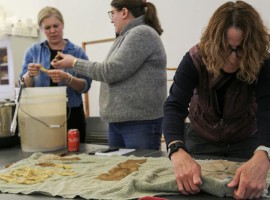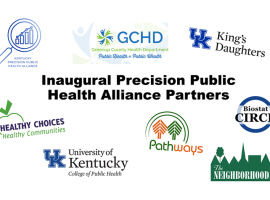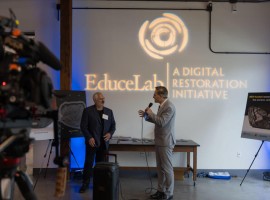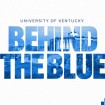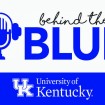'Behind the Blue' - Part Three: The Vaccines to Combat a Coronavirus With Brooke Hudspeth and Vincent Venditto
It has been nearly one year since the SARS-CoV-2 coronavirus changed the world. With millions of people infected and over a quarter-million dead in the United States, the novel coronavirus continues its pervasive hold on our health and well-being.
After months of stress, frustration and uncertainty, people are itching to travel and visit loved ones during the height of the holiday season, despite increasing cases of COVID-19. As the virus continues to dominate news coverage, people are clinging to the anticipation of promising vaccine trials from Pfizer, Moderna and several other companies. How will these vaccines, and potentially others still to come, change the course of the pandemic? Will we be able to return to normal and how long could that take?
On this episode of Behind the Blue, we speak with Vincent Venditto, an assistant professor in the University of Kentucky College of Pharmacy’s Department of Pharmaceutical Science, and Brooke Hudspeth, an associate professor and Chief Practice Officer for the University of Kentucky College of Pharmacy. In our third and final part of this interview, we ask Vince and Brooke about how this pandemic possibly ends, and how we progress into a new world after COVID-19.
"Behind the Blue" is available on iTunes, Google Play, Stitcher and Spotify. Become a subscriber to receive new episodes of “Behind the Blue” each week. UK’s latest medical breakthroughs, research, artists and writers will be featured, along with the most important news impacting the university.
For questions or comments about this or any other episode of "Behind the Blue," email BehindTheBlue@uky.edu or tweet your question with #BehindTheBlue.
To discover what’s wildly possible at the University of Kentucky, click here.
KODY KISER: I was going to ask, how does this end for us? Do we ever reach a place where we just have small outbreaks, like Ebola or things that we've managed to contain? Do we ever reach a place where this is mostly contained? Or will we be getting these vaccinations forever? And that kind of leads into another question where I was kind of thinking about, why do we need to get some vaccines every year, others only need boosters every so often, and some we get when we're kids, or at some point, it seems like we never need another vaccination for a while? So, I guess tackle any part of that you want to tackle.
VINCE VENDITTO: So I'll start answering this from how our immune system works. And so when we are infected or when we get immunized, the idea is that we're helping the immune system respond to what we may be infected with in the future, right? So you get a flu vaccine, you hope that flu vaccine will prevent you or will help your immune system respond when the flu virus actually gets into your system.
And the way that it does that is by producing what we call a memory immune response or memory cells. And those cells remember what they're supposed to respond to and that memory is induced by the vaccine. And so, when you are reinfected or when you're infected with flu after a vaccination your memory cells are already there.
They can respond faster and stronger than if you were infected without the vaccination. And so there are vaccines, maybe the most common that we think about is tetanus, where every 10 years you have to go back and get your tetanus vaccine, and that's because the memory response that we produce, it wanes, it goes away. And that has to do with how our immune system responds to the vaccine, it has to do with how the vaccine is engineered. And all of those components are in there so that, 10 years later, you don't have any more immunity, you don't have any more of that memory that we need in order to respond.
So you go to get a booster shot and that protects you for the next 10 years. And it's about 10 years, every 10 years, we have to get it boosted. And that is all because of our immune system and how the vaccine is engineered. On the other hand, we think about flu, where we have to get vaccinated every year because flu changes, flu mutates.
A year in advance, so during our current flu season, which is happening right now, during our current flu season, our public health experts are in China, and Hong Kong, and Russia looking to see what flu strain is happening around the world. And because we know that whatever it looks like in those countries, we will eventually get a strain that comes around to us. And it's just how flu cycles around the world.
And so we can get an idea of what's happening a year in advance on the other side of the world. We know what mutations can occur based on how we understand mutations occurring. And so every year, we get a different flu strain that comes around and we don't have immunity to it. So we need to get that vaccine.
And the vaccine that we have for flu is a prediction of what will likely come around to us based on what's around, what's in the other side of the world. But one interesting story about this is the swine flu in 2009, we call it H1N1. That was the same virus that infected us during the 1918 flu pandemic.
And people who were alive in 1918 still had memory, and their antibody, their immune response was able to neutralize the H1N1 swine flu in 2009. So almost 100 years later, they had still protective memory response. And so flu, we generally don't see the same flu strain coming back over and over again, but when that does happen, it indicates that flu is able to produce a really strong memory response and is able to protect us.
But because flu mutates, every year, we have to get a new immunization to protect us against the new flu that's coming out. With coronavirus, with this SARS-CoV-2, at least COVID, it doesn't mutate very fast. It doesn't mutate very rapidly. There are different strains, but it looks like the vaccines are working regardless of these minor mutations that are happening. They're not mutations that are significant enough to prevent us from getting a vaccine and not getting protection towards the coronavirus.
KODY KISER: Is there any chance at all that we may see something similar happen here, that SARS-CoV-2 disappears for a while, that we don't see it anymore? It came from, like, there was a animal to human kind of jump. Is there a possibility that it goes in the opposite direction and maybe goes off the radar for a while?
VINCE VENDITTO: That's a good question. So it is possible for it to go backwards, at least that's the way that it looks. And I believe it's in Denmark, they had mink farms, and they saw transmission from human to mink, and from mink back to humans. So it does look like there can be a reservoir. They had to cull all those mink because of the risk of having this reservoir in organisms.
The thing is I don't know that we're ever going to get rid of it in the human population. I mean, we have common cold, coronavirus is with us always. I guess really the correct answer is we don't know enough about it right now, right? We're only eight months into this. Coronaviruses have been around with us for years, for hundreds of years.
And we deal with them, right? We have immune responses to them that protects us. And even you might have a cold, you get a runny nose or something, you have a common cold coronavirus and you're effectively protected. The bigger risk would be if it went to an organism and then mutated in that organism and then came back to us.
Now we have a different coronavirus, and that's something that we can't really predict. There's obviously virologists and people out there that do this type of work and try and look at how coronaviruses can mutate. And this coronavirus has similarities to other coronaviruses, but it also has a significant difference. And that's what allowed it to spread around the world.
Is that difference in the-- it kind of has it gets into cells in a certain way, and it's able to not be so lethal that it kills you as soon as you're infected, but lethal enough where we have the significant problem. And because of this kind of sweet spot that it's found, it's been able to spread around the world, and we haven't really been able to get control of it.
So it's impossible to know what's going to happen in the future, obviously. But I think there are things that we're thinking about as scientists collectively. I'm not necessarily doing any of this work, but virologists and people who study coronaviruses are certainly looking into these things.
INTERVIEWER 2: I think it's so fascinating to have this conversation and to give people who really would have no reason to think about science and what goes into all of this on a daily basis, we're seeing it on a daily basis. And I think it's really fascinating and eye opening for people like me who don't have a clue to see how this happens and works so. I appreciate you guys giving some insight. It's very, very interesting.
VINCE VENDITTO: No problem, thank you.
BROOKE HUDSPETH: [INAUDIBLE] Thanks.
KODY KISER: It very much has dominated. I know people are fatigued with talking about this and fatigued with all of the steps that we have to go through. It has dominated our world, our lives, our day to day for the better part of a year, almost a year. One question I want to ask to that end, and to the work that the two of you do.
What has this meant, in a sense, to the College of Pharmacy, or to research, or to the type of training that you're doing with students as we send them out into the world, into this world. How have things changed in the last eight to 10 months?
BROOKE HUDSPETH: Yeah, so clearly, the focus has really shifted, and a lot of efforts have been put in to just a new way of life in general. So how students are trained, and just even those components of more of these hybrid instruction approaches. So just some of the day to day impacts, but then, I think, to your question about how are we training and preparing students to go and be a part of the solution, and inevitably what they will face in their practice as pharmacists, we have started to really incorporate some of this training in the curriculum, in their courses to these students.
And another big piece that our students are taking part in, they helped with the testing efforts and really stepped up when some of our pharmacy partners were getting involved. But I think you'll see them step up to an even greater extent with the immunization. So we talked about the role that pharmacists have in these immunization efforts. I think we're going to see that magnified and increased utilization of our students to help with these efforts.
So I know our state public health officials have really called on students across the state, but specifically our students at the College of Pharmacy to play a role when the vaccine does become available. I think we have send some students who are eager to step up and be a part of these efforts. And so we are starting to work right now in the planning stages with our local health officials to ensure that our students are able to play a role in these efforts to get the population vaccinated.
VINCE VENDITTO: I'll answer the question in two ways I think. So, first, focus on COVID. I think anytime something significant like this happens, you can either-- you know, it feels like you don't have control over it, and you want to have some level of control, you want to have some level of managing.
I remember when we first got shut down being home, it was tough, I think, for everybody to start working from home, not going into the office. Our whole routine was disrupted, and getting that motivation to do the things that we need to do for our jobs, right? I mean, it was a challenge. Cody, I'm not sure where you are right now with the background. It looks like you might be in your office, maybe your home office.
KODY KISER: Home, like many, many other people.
VINCE VENDITTO: Home office.
KODY KISER: Yeah.
VINCE VENDITTO: All four of us that are in our home offices, right? Our lives really, really changed with this. But I think giving students an opportunity, and even myself, it's certainly helped for me to focus my efforts into COVID-19. So when our students were bottling hand sanitizer from the James Beam Institute, it allowed the students to put their hands around the situation and take control of it, and feel like they were contributing, and they were contributing.
But they were able to have that peace of mind that they're actually doing something that's benefiting society. Which I think is why all of our students are in pharmacy school because they're wanting to benefit society in some capacity. And I know that it helped for me. We set up antibody testing in my lab, and we're partnering with pharmacies to do community testing.
And that certainly allowed me to focus on the importance of getting these things done, and getting over that hump of well, I don't know how am I going to work from home today. But when you set your sights on focusing on COVID, it allowed me to focus a little bit more on what I needed to do. I think outside of the realm of COVID though, we're always teaching our students. They're student pharmacists. We don't know what you're going to be prescribing in 20 years.
We don't know what drugs are going to be on the market. All we can do is teach you the fundamentals of how to teach yourself. And I think COVID really is a great example of this where nobody knew that COVID was going to happen, right? I mean, in December and January, public health experts knew that this had a chance of spreading around the world.
But you think back to when I was teaching my same course a year ago, the students, none of us had any idea that any of this was going to happen. And so I think it's a great example of showing students that we can't anticipate what's going to happen 20 years from now. But we can't even anticipate what's going to happen next year.
And so we need to teach our students how to be able to read literature, interpret data to understand the field of pharmacy, the field of science in general, and learning how to wrap their hands around the profession that they're getting into so that they're able to properly care for their patients. And they're able to not only care for their patients, but also be an advocate, and be able to explain things to the patients when things like this happen, or things that they didn't necessarily learn in the classroom.
KODY KISER: I do think about that too, that you're talking about, you mentioned the hand sanitizer, and it's got to be for students, I would think it would have to be kind of inspiration or motivator to really kind of reaffirm that this is what this is exactly why I went into this because these things happen, and they're random, and you can't predict for them.
And so learning how to adapt, and adjust, and being that much more motivated into the research behind this. And I can imagine that it probably [INAUDIBLE] students really makes them think about more specialization of, like, I want to learn more about this particular aspect of what I'm here studying so that I can have a more of an effect on this particular element of this, which I'd never even thought about last year because we weren't dealing with this.
So yeah, it just seems like it opens a lot of new doors in the midst of all of this chaos and all of this terrible thing that we've been dealing with, that there is at least some silver lining to this that may help us in the future.
VINCE VENDITTO: Yeah, for sure. Yeah, it's so important.
KODY KISER: Is there anything we haven't asked either of you that maybe you feel is important to mention? Anything we didn't touch on that you might want to mention or any last final thought that you want to put out there?
VINCE VENDITTO: I do. I'll let Brooke go first.
BROOKE HUDSPETH: You know, I think we covered most everything that I was thinking of. I think just the background piece of how vaccines are developed, I think that's important for individuals just to have a broad sense of that. And then how that looks a little bit different with COVID-19, and how we can still be assured that we're going through the steps appropriately.
And then I think the other piece of the distribution and what that looks like, and some of the longer term effects. And then also how our students are playing a big role. Those are the big things that were on my list. So I think we've covered all of those.
VINCE VENDITTO: So I think, and Brooke just brought this up, the monitoring after approval. And when we think about the vaccine trials that are happening right now, there's 40,000 people in each one of these trials-- at least 40,000 people in each one of these trials. And the data that they're reporting where they have 90 or 95% efficacy, they're seeing less than 100 cases. So all of this is based on less than 100 cases.
And so when a vaccine is approved, it will be deemed safe by all of the regulatory agencies and all of the appropriate things are in place to say that it's safe. I think the one thing that we need to be aware of though, is when you're looking at 100 cases or less than 100 cases to show efficacy-- and there they're continuing to follow these patients for months.
So they're going to have many more cases-- but if we think about 100 cases, who are those 100 cases happening in, right? I mean, are they happening in 65 and older patients? Are they happening in, are those cases in our African-American population? Are they in our Native American population?
And so, once a vaccine is approved, that continued monitoring is going to be really important to make sure that we have efficacy in each of these populations. And I'll provide a short story about a vaccine that was approved previously for haemophilus influenzae and there were two vaccines that were approved. They were basically the same vaccine.
One had a slightly different linker, both showed efficacy, and the one vaccine, they both were approved, they rolled them both out. The one vaccine that they sent to the Native American population for immunization, it didn't work in that population. But the other one did, and there's not really a good explanation for why one worked and one didn't.
But it's clear that in their initial analysis, they didn't have the number of patients from each of those populations that were necessary to evaluate efficacy in the Native American population. And so we need to think about that for these vaccines as well. It's important that we have multiple vaccines that are going through the process. One vaccine may not work in a certain population and it may work in another population.
It doesn't mean it's going to be unsafe. It just may not protect you. So that's another important aspect of once you're vaccinated, you may be in a population where we didn't have enough data to say that this was exactly-- that this will work perfectly for you. So it's important to be aware that once the vaccines are rolled out, that we continue to wear masks, that we continue to social distance, that we're not traveling.
I know me and my wife, we're not traveling to see anybody for the holidays. We had a very nice Thanksgiving by ourselves with our two dogs, and it's going to be the same thing for Christmas. So I think it's important for us to continue that, to all the social distancing and everything.
KODY KISER: This has all been a very deep dive to some degree in this. I know we could go on for a long time. I want to be very mindful of your time in this though. Brooke Hudspeth and Vince Venditto. Thank you both very much for being with us. We greatly appreciate your time and your knowledge and expertise on this.
And we would like to say that we reserve the right to call you back on to the podcast at some point down the line if there's more that we find we need to talk about, or need answers on, or need some clarity on. So thank you both very much. We appreciate it.
VINCE VENDITTO: Thank you Cody. It's a pleasure to be here and happy to come back.
BROOKE HUDSPETH: Yes. Thanks so much. Appreciate it.
